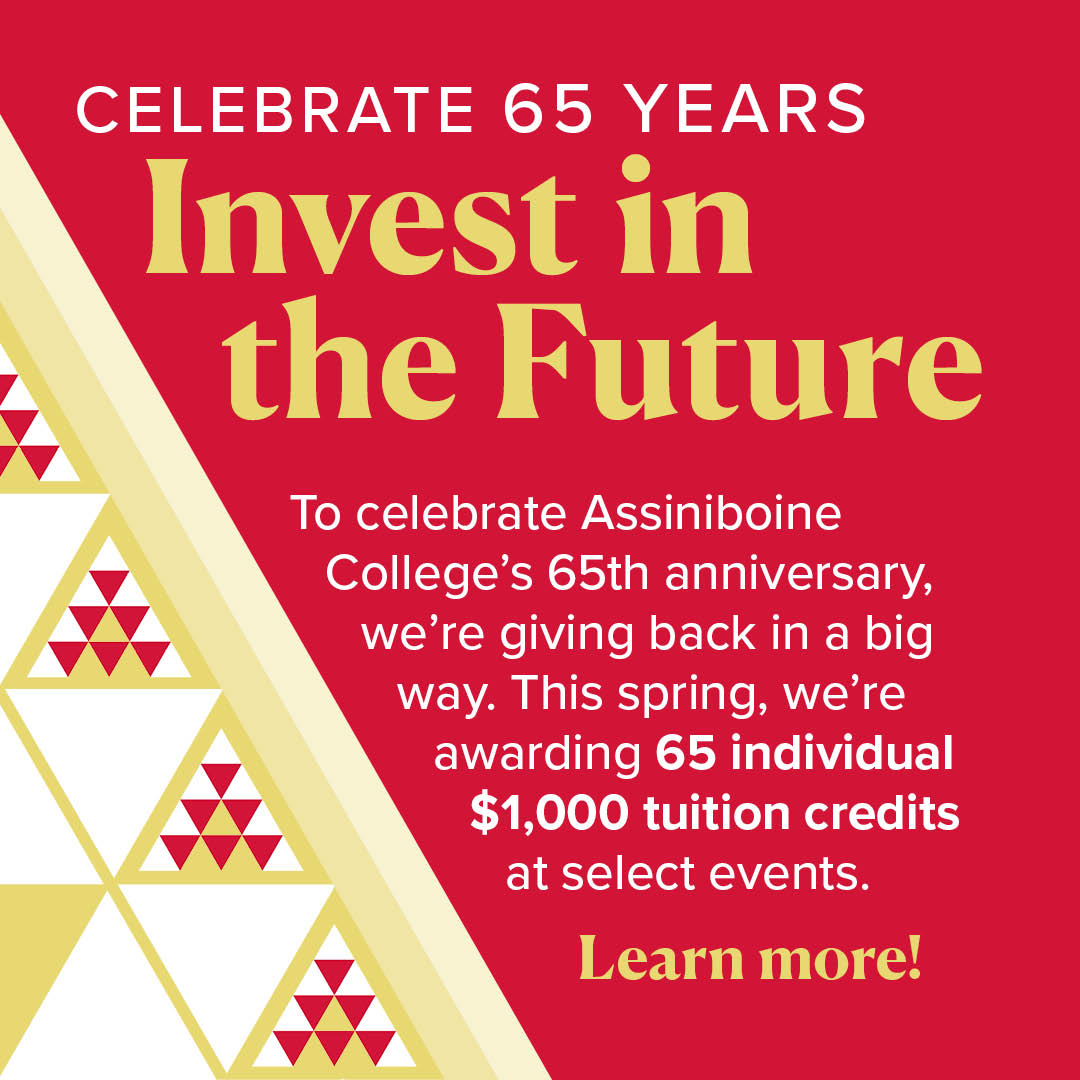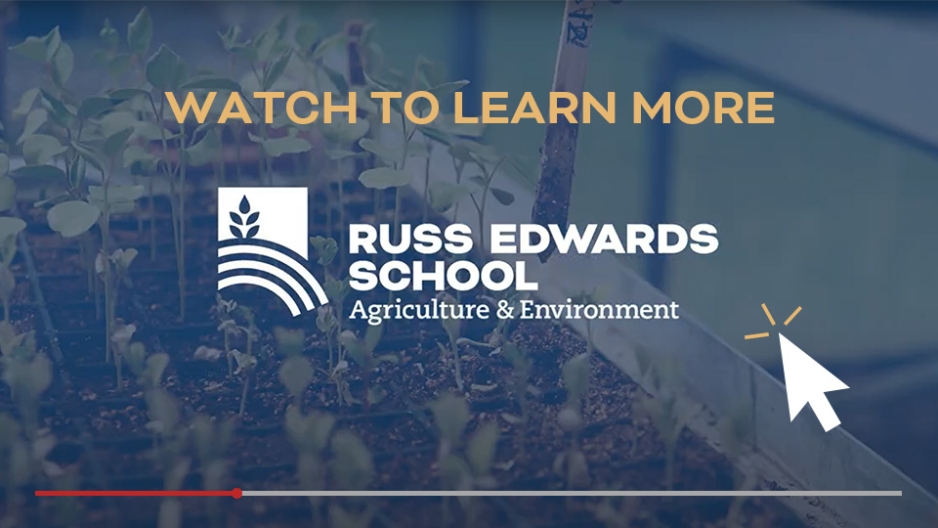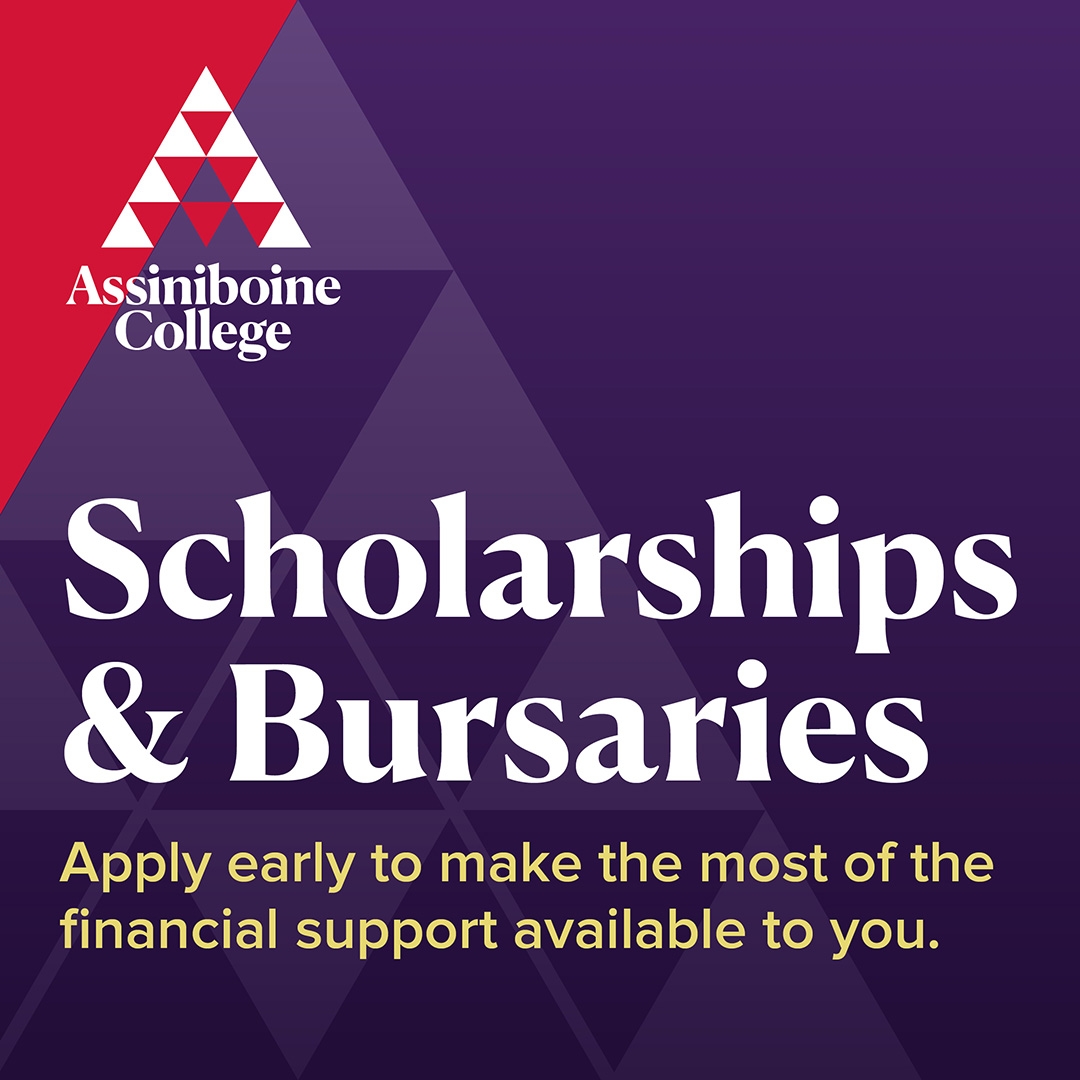Civil Technology
Municipal Engineering Specialization
Overview
Assiniboine’s two-year Civil Technology - Municipal Engineering specialization diploma, provides graduates with the skills to carry out higher level design and technical functions related to a broad range of civil engineering fields including structural, municipal, highway and transportation engineering, and water and drainage resources.
As members of a multidisciplinary team, graduates facilitate the interaction among a range of project stakeholders to contribute to the accomplishment of civil engineering project goals in accordance with project plans, workplace health and safety practices, sustainability practices and all applicable laws, codes, industry standards and ethical practices.
Civil engineering technologists provide technical support and services to scientists, engineers and other professionals, or may work independently in fields such as structural engineering, municipal engineering, construction design and supervision, highways and transportation engineering, water resources engineering, geotechnical engineering and environmental protection.
KEEP ME IN THE LOOP!
Fill out the form below to receive more information about our program and related events.
Program Learning Outcomes
- Collect, process, analyze and coordinate technical data to produce written and graphical project-related documents.
- Use industry- specific electronic and digital technologies to support civil engineering projects.
- Participate in the design and modeling phase of civil engineering projects by applying engineering concepts, technical mathematics and principles of science to the review, production and/ or modification of project plans.
- Contribute to the scheduling and coordination and cost estimation of civil engineering projects and monitor their progression by applying principles of construction project management.
- Coordinate and perform quality control testing and evaluate equipment, materials and methods used in the implementation and completion of civil engineering projects.
- Complete duties and monitor that work is performed in compliance with contractual obligations, applicable laws, standards, bylaws, codes and ethical practices in the civil engineering field.
- Promote and carry out sustainable practices in accordance with contract documents, industry standards and environmental legislative requirements.
- Facilitate the collaboration and interaction among the project team and project stakeholders to support civil engineering projects.
- Apply teamwork, leadership, supervision and interpersonal skills when working individually or within multidisciplinary teams to complete civil engineering projects.
- Develop and use strategies to enhance professional growth and ongoing learning in the civil engineering field.
- Comply with workplace health and safety practices and procedures in accordance with current legislation and regulations.
Examples of what jobs civil technologists can do:
- Graduates work in a range of employment settings including consulting engineering, civil construction and surveying firms, quality control facilities and municipal government engineering or operations departments.
- Graduates are typically employed in entry-level positions in the field as municipal design technologists, structural design technologists, estimators or technical representatives.
Success Factors
You might be a good fit for this program if you would enjoy:
- Building on your Civil Technician certificate for career advancement to technologist level.
- Learning advanced theory and practical technology skills including computer-aided design and modeling, field surveying, 3D modeling, and laboratory testing.
- Project management, team environments, and leadership challenges.
- Being part of major infrastructure projects across the region and in your community
A valid driver’s license and access to a vehicle is strongly recommended given the need to travel for co-op placement.
The industry and program environment require individuals to:
- Work in a variety of environments including laboratories, offices and industrial areas and working conditions may include a combination of indoor and outdoor work.
- Work outdoors which could include conducting field inspections or investigating topography, soil, drainage and water supply systems, road and highway systems, or buildings and structures.
- Keep up with technological advances in surveying, environmental monitoring, data management and civil design that has allowed for work to be completed more quickly than in the past.
- Tolerate environmental conditions and potential hazards from equipment and construction materials when performing field work.
- With experience, civil engineering technologists can progress to construction supervisors, project engineers or managers, construction estimators, or construction managers.
Admissions
Admission Requirements
- Civil Technician certificate from Assiniboine College. Applicants with a Civil Technician certificate from other post-secondary institutions will be assessed on a case-by-case basis.
English is the language of instruction at Assiniboine. All applicants educated outside of Canada or in a country not on the test exempt list are expected to meet the English language proficiency requirements.
READY TO TAKE THE NEXT STEP IN YOUR EDUCATION JOURNEY?
Start your online application today and join Assiniboine College!
DON'T HAVE A DEGREE OR DIPLOMA? START HERE.
We understand that a fulfilling career in Civil Technology is not only for those who already hold academic qualifications. If you're at the beginning of your journey and do not have a diploma or degree, consider exploring our Civil Technician program at Assiniboine.
Careers & Connections
Career Opportunities
- Engineering and architectural firms
- Manufacturers
- Construction and development companies
- Inspection testing agencies
- Material suppliers
- Departments within government
Connections
Assiniboine has a number of agreements with other colleges, universities and professional organizations, making it possible for students to apply credit taken at Assiniboine to programs at other institutions. For information on agreements, see Articulation Agreements.
Tools & Supplies
Our classrooms, labs and shops are equipped with the necessary equipment that you need to make the most of your experience. However, there are some tools and supplies that you will need to purchase for personal use to help you with your studies. Much of what you purchase, you’ll be able to use after you graduate and begin your career.
Program Checklists, Textbooks, and Supplies
ASSINIBOINE BOOKSTORE
Textbooks, supplies and uniforms may be purchased at the Assiniboine Bookstore at the Victoria Avenue East Campus. Booklists are available from your school office 30 days prior to the start date of your program.
Technology Requirements
Students in this program are required to bring their own laptop for use on-campus. The laptop must meet the technical needs outlined by the program. MAC computing devices are not compatible with program software. See Technology Requirements for detailed information.
Courses & Costs
Costs
Estimated Program Costs (Domestic)
Tuition, fees and Students’ Association fees total approximately $9,985 (per year). Estimated cost for books and supplies is $1,020.
COOP-0028 Co-op Work Placement fees are additional and will be assessed upon registration for the course. All fees are estimated and subject to change without notice.
Estimated Program Costs (International)
Tuition, fees and Students' Association fees (Inc Health Premium) total approximately $15,585 (per year) for international students plus required health insurance of approximately $1,125. This is for 51 credit hours (one year) of the two-year requirement to complete this program. Estimated cost for books and supplies is $1,020.
COOP-0028 Co-op Work Placement fees are additional and will be assessed upon registration for the course. All fees are estimated and subject to change without notice.
All tuition and fees are required to be paid in full before your program begins. Tuition and fees to this program are non-refundable and non-transferable. All fees are estimated and subject to change without notice.
For more information, visit the Fees and Charges page.
Courses
To graduate with a Civil Technology - Municipal Engineering specialization diploma, students must successfully complete 111 credits. Courses are offered in a block (Group A/Group B) alternating years. The minimum passing grade for each course is indicated on the course outline. Course offerings are subject to change and may vary by intake.
Group A
| Title | Credits/CEUs | Elective | Distance | PLAR |
|---|---|---|---|---|
Calculus and Statistics (MATH-0084)Prerequisite: MATH-0093 Algebra (Civil) |
9 credit(s) | No | No | No |
Co-op Work Placement - CVLTM (COOP-0028)This requires a minimum of 480 hours of full-time, paid, related work experience. The work placement, which is normally of 16-week duration, is subject to prior approval of and monitoring by a designated faculty member. Credit is given subject to the student submitting evidence that the work has been successfully completed. Work experience acquired prior to registration in the program is not eligible for this credit. |
12 credit(s) | No | No | No |
Geotechnical Materials 1 (ENGR-0039)In this course, students examine and analyze basic geotechnical definitions, different soil types and structures. Students study the computation of volume and mass relationships of soil-water mixture, determination of grain size distribution, Alterberg limits of soil, soil density, density tests and compaction and field compaction control. Students learn about soil by means of visual identification and with triangular charts, AASHTO (American Association of State highway and Transportation Officials) and the United Classification Methods. Students also study site investigation, gravitational water, frost action and permafrost. |
9 credit(s) | No | No | No |
Hydromatics (SCIE-0078)This course consists of two modules. The first module covers the basic properties of fluids and their use in calculating static pressure and hydrostatic forces on plane and curved surfaces. The course enables students to predict fluid behaviour, identify and describe various types of flow, and use the Continuity and Bernoulli Equation to solve simple hydraulic problems under steady flow conditions. Rate meters are discussed with methods of calibrating these devices. A systematic approach to solving problems in open channels (gravity flow) and closed conduit (pressurized) flow is discussed. Both SI and USC units are used. |
9 credit(s) | No | No | No |
Municipal Computer Apps (COMP-0514)In this course students learn to use computer software, (primarily AutoCAD 2004 and Land Development Desktop R4), to solve practical problems in Municipal Technology. Topics include working with point data, adjusting traverse data, creating surface models, designing earthwork and roadway projects, estimating volumes and designing subdivision layouts. |
7.5 credit(s) | No | No | No |
Project Administration (BUSN-0151)This course provides students with an understanding of the content and organization of contract documents and how they are used in the estimating, bidding and construction phases of a project. Students learn the basic procedures for preparing detailed quantity take-offs, pricing of labour and materials, project management and contract administration. The project management portion of the course introduces concepts such as Gantt and PERT charts, task dependencies, resource allocations and critical path planning. Students learn practical application using Microsoft Project and apply these skills to complete the scheduling for an appropriate project. |
9 credit(s) | No | No | No |
Roadway Design 1 (ENGR-0040)This course consists of the field methods of laying out simple and vertical curves and calculations pertaining to them, special problems in curves, construction survey procedure, and data collection and stakeout with Total Station. |
7.5 credit(s) | No | No | No |
Terrain Analysis (SCIE-0079)This course introduces students to the various landforms that make up terrain and the processes involved in its creation. This course focuses on the external earth processes such weathering, mass-wasting, fluvial, and glacial processes and their resultant landforms. Students apply their knowledge to interpret terrain using topographic maps, store pairs of aerial photos and other remotely sensed imagery. |
6 credit(s) | No | No | No |
Group B
| Title | Credits/CEUs | Elective | Distance | PLAR |
|---|---|---|---|---|
Applied Research Project (BUSN-0153)This course consists of completing and submitting a formal comprehensive and substantive report on a topic related to the municipal engineering field. Students select a topic involving either an original design project or practical laboratory project, which must be approved by a staff member designated as thesis advisor. Students perform the necessary theoretical or practical research under the guidance of the thesis advisors and submit a thesis report for evaluation. |
6 credit(s) | No | No | No |
Economics/Management (BUSN-0152)Study the application of economics to engineering matters including financial mathematics i.e. interest and annuities. Learn how to evaluate engineering proposals and gain insight into organizing and operating your own business. Then, examine all aspects of management at the supervisory role in technology. Study the role of first level management, including supervisory instruments, techniques and relationships with employees, senior management and unions. |
6 credit(s) | No | No | No |
Geotechnical Materials 2 (ENGR-0041)This course consists of evaluating shearing strength of soils, using the Mohr's envelope and Coulomb's equation to represent the shearing strength of soils. Furthermore, it consists of understanding the concept of total and effective stress, slope stability analysis, vertical and horizontal stresses in a soil mass and determination of the consolidation characteristics of soils. The course introduces the behaviour of seepage water, the hydraulic conductivity properties of different soils, methods of soil and slope stabilization. |
9 credit(s) | No | No | No |
Hydrology (SCIE-0080)This course introduces students to the study of hydrology and focuses on the physical process of water movement via precipitation, interception, evaporation, runoff, infiltration, groundwater flow and stream flow. Appropriate hydrologic models will be discussed in this course. Since hydrology is a quantitative science, assignments involving calculations using Excel form is an important part of the course. |
7.5 credit(s) | No | No | No |
Pavement Mix Design (ENGR-0042)This course consists of the evaluation of concrete pavement structures. It deals with Portland cement concrete structures and Hot Mix Asphalt cement structures using for roadway surfaces. Pavement management systems are introduced and reviewed. |
9 credit(s) | No | No | No |
Roadway Design 2 (ENGR-0043)This course consists of design of horizontal and vertical alignments using RTAC design criteria, cross-sectional elements, earthwork calculations including mass diagram, run-off calculations and culvert design. |
9 credit(s) | No | No | No |
Water and Waste (SCIE-0081)This course is an introduction to the design of water supply, waste water disposal and land drainage systems, with special emphasis on piping. Practical application is done with respect to the design of the subsurface works for a subdivision selected as a thesis project. |
9 credit(s) | No | No | No |





